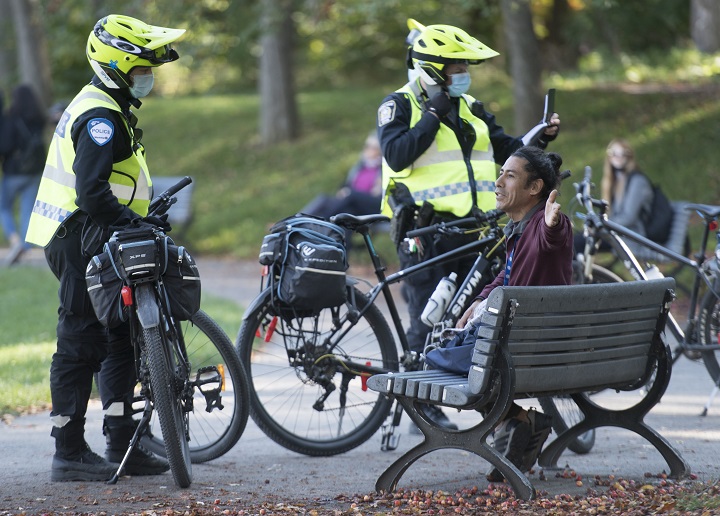There’s little evidence the threat of heavy fines is encouraging Canadians to follow COVID-19 rules, according to a new report by researchers at the University of Toronto and Carleton University.

Researchers Alex Luscombe and Alexander McClelland say provinces such as Quebec are increasingly turning to threats during the second wave of the COVID-19 pandemic. But the criminologists, who have been tracking police responses to the pandemic since early April, say people tend to follow rules they perceive as legitimate.
“If you’re going to create a rule, that rule needs to have legitimacy,” Luscombe, PhD candidate at the University of Toronto, said in an interview Wednesday. “People need to understand it, they need to agree with it.”
An example of the government’s confusing orders was recently illustrated, he said, by Quebec’s second opposition party, Québec solidaire. The party said it didn’t understand why a pork-processing plant where more than 100 workers contracted COVID-19 is still operating but the province’s COVID-free cinemas are shut.
During the first wave of the pandemic, Quebec issued more fines than any other province, followed by Ontario and Nova Scotia, Luscombe said. Quebec is also the province hardest-hit by the novel coronavirus, reporting significantly more infections and deaths than any other part of the country.
Other provinces, such as British Columbia, which made little use of fines during the first wave, are now issuing more fines in an attempt to ensure compliance, Luscombe said. “There’s been a lot more places using this approach.”

Get weekly health news
On Wednesday, the province’s deputy premier, Geneviève Guilbault, threatened to fine restaurant owners who defy partial lockdown orders. Her comments came after two restaurants in the Saguenay region said they planned to reopen Friday. Saguenay was placed under Quebec’s highest COVID-19 alert level Monday, which forced the region’s restaurant dining areas, bars, gyms and entertainment venues to close.

Guilbault told reporters if restaurant owners choose to open, the government will be prepared — last week it adopted a decree allowing police to fine customers found in businesses that had been ordered closed. The decree followed an announcement by some gym owners who said they would defy orders and reopen. But most owners changed their minds and stayed closed.
Luscombe said the gyms owners’ change of heart is not necessarily a sign that fines are working to deter people. “I think there are too many factors at play in that situation to draw the conclusion that the threat of fines alone led to the gym owners backing down,” he said.
Even if it was the threats of fines that made gym owners relent, “it doesn’t necessarily follow that fines will work in other contexts like deterring large parties or getting people to wear masks in public,” Luscombe said.
The researchers’ report, called, “An extreme last resort: Monetary Penalties and the Policing of COVID-19 in Canada,” was released on Tuesday by McGill University’s Centre for Media, Technology and Democracy. The report’s name, the authors say, is a quote from a Montreal officer who had said publicly that police would prioritize educating people and would use fines as an “extreme last resort.”
Luscombe said, however, that he hasn’t seen evidence Canadian police are focusing on education, adding that he’s not sure they’re the right agency to promote public health education. “The police are not really designed or trained to do that,” he said.
Meanwhile, Olymel said Wednesday 74 workers at its meat packing plant in Princeville Que., have tested positive for COVID-19. The plant, which employs 370 people, remains in operation but at reduced capacity, company spokesman Richard Vigneault said.
Quebec reported 1,029 new cases of COVID-19 Wednesday and 33 more deaths attributed to the novel coronavirus, including eight in the previous 24 hours. The Health Department said 539 people were in hospital, an increase of 13 patients, and 81 people were in intensive care, a decrease of four.
A government-funded public health institute said 5.1 per cent of tests analyzed on Tuesday were positive — a metric the centre began releasing publicly on Wednesday.
The province has reported a total of 109,918 cases of COVID-19 and 6,350 deaths linked to the virus.








Comments
Want to discuss? Please read our Commenting Policy first.